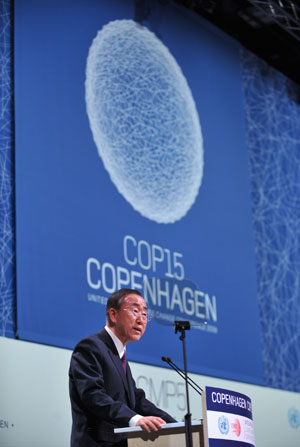COPENHAGEN, Dec. 15 (Xinhua) -- UN Secretary General Ban Ki-Moon said on Tuesday that China, a developing country, has taken important measures in reducing its emission of greenhouse gas.
"China has also taken quite important measures by cutting forty to forty-five percent of energy intensity by 2020," Ban said at a press conference on the sidelines of the UN climate change conference in Copenhagen.

UN Secretary-General Ban Ki-moon addresses the opening ceremony of the high-level segment of UN Climate Change Conference in Copenhagen, capital of Denmark, Dec.15, 2009. (Xinhua/Wu Wei)
Ban arrived here earlier on Tuesday to open a high-level segment of the conference, which entered its ninth day of negotiations on a new global deal to push forward the fight against climate change.
The UN chief said he was fully aware of particular challenges faced by developing countries, in particular poor countries, calling on rich countries to improve their commitments in climate financing.
The climate change negotiations were now in a critical but difficult situation as developed countries and developing countries remain divided on key issues, including climate financing.
Developed countries have been reluctant to provide financial support to help developing countries mitigate and adapt to climate change. So far, they only indicated to give 10 billion U.S. dollars annually in the three years between 2010 and 2012.
Ban said developed countries should go beyond the fast-start support and also address medium and long-term financing scaled up to needs.
"I have been urging that developed countries should begin discussing the medium and long term financial support packages," he said, calling on all countries to overcome national interests or interests of any particular groups.
"That would be one of the keys in bridging the gap between developed and developing countries," he added.
Speaking at the same press conference, Danish Prime Minister Lars Lokke Rasmussen said he was encouraged by China's move to set national targets of reducing greenhouse gas emission.
"I am very encouraged by the fact that China has proposed, at this stage, nationally binding targets for mitigation which deviates from business as usual," he said.
But he added China should translate those national targets into some kind of international language.
